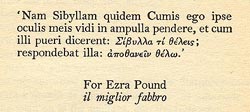
In literature, an epigraph is a phrase, quotation, or poem that is set at the beginning of a document, monograph or section or chapter thereof. [1] The epigraph may serve as a preface to the work; as a summary; as a counter-example; or as a link from the work to a wider literary canon, [2] with the purpose of either inviting comparison or enlisting a conventional context. [3]
Contents
A book may have an overall epigraph that is part of the front matter, one for each chapter, or both.


